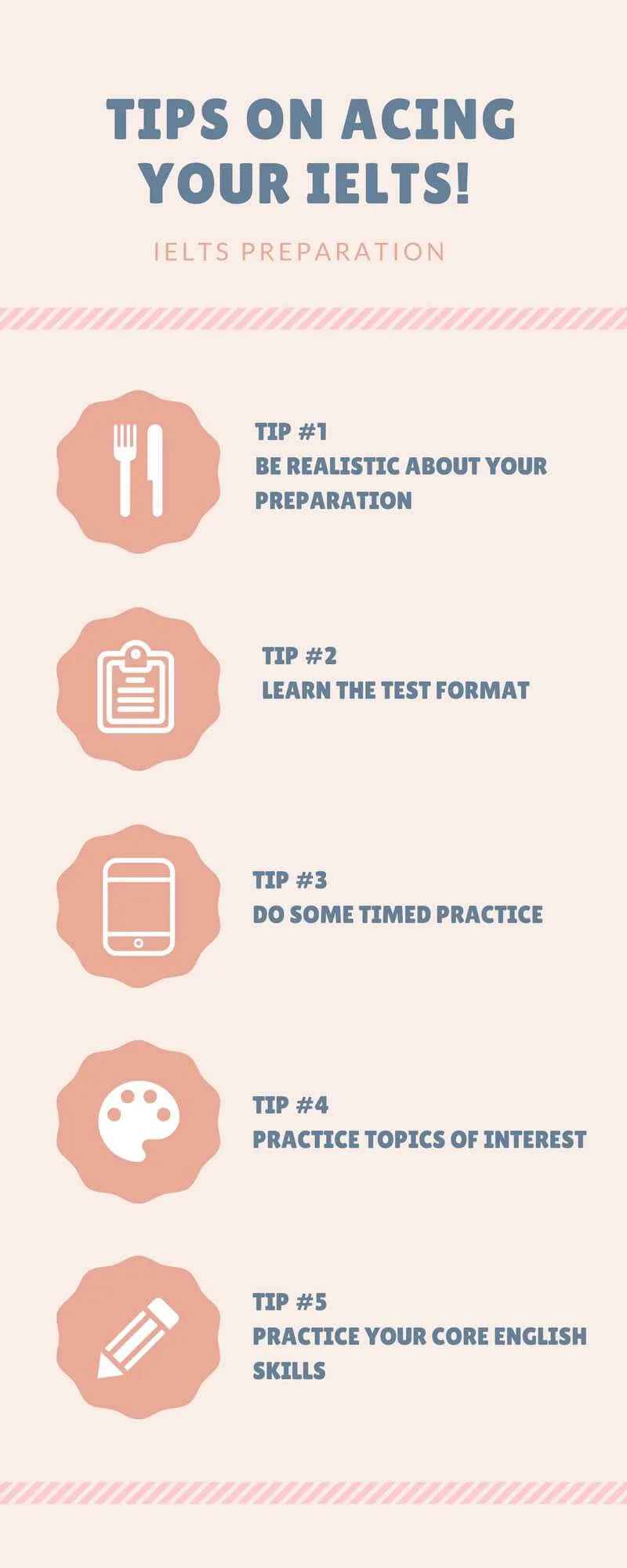IELTS Preparation: Ace the IELTS | Tips and Strategies!
So, how do you prepare to ace the IELTS? Check out 5 important tips below and apply our effective strategies to your IELTS preparation!

Entering your IELTS exam after adequate preparation is a key component for achieving IELTS success. Start preparing for your IELTS by learning some crucial tips and strategies on how to ace the IELTS!
Mục Lục
Tip #1 Be realistic about your IELTS preparation
Taking the IELTS doesn’t have to be scary even though a lot can depend on your success in this high-stakes test. Test preparation doesn’t have to be long, boring, frustrating or exhausting. There are many ways you can prepare to achieve success, after all, preparation is the number one key if you want to ace the IELTS.
Allocate 4 weeks study time
Firstly, allow yourself a decent amount of time – at least four weeks of devoted study. Spend a couple of days learning the test format. You will really understand the different parts of the test, what’s included, and the timing of each section. This will help you know what to expect on test day.
Tip #2 Learn the test format
Knowing the structure of the test format will ensure that you can prepare adequately for each section on the test. Here’s a quick breakdown:
- 30 minutes
- 4 audio recordings
- 40 questions
- 60 minutes
- 4 passages (academic) 3 passages (general)
- 40 questions
- 60 minutes
- Task 1: 150 words (20 minutes)
- Letter (general) – Describe chart/graph (academic)
- Task 2: 250 words (40 minutes)
- Essay (general and academic)
- 11-14 minutes
- Part 1: Interview (personal information)
- Part 2: Short presentation (2 minutes)
- Part 3: Discussion
Allocate formal study time each day to learn methods and apply them to practice. It’s important to familiarize yourself with the types of questions you will encounter in the test. These are very specific to the IELTS, so practice is necessary.
Tip #3 Do some timed practice
Time-management during the test is another major key to achieving a successful result. Once you have learned the parts of the test, and practiced the methods, do some timed practice. Allow yourself 50 minutes to read 3-4 articles and answer 40 questions.
Learn the writing formulas that are very specific to the IELTS. Then, practice writing a letter or chart description in 20 minutes and an essay in 40 minutes. Have a native speaker or an English teacher look over them and give you some feedback.
Practice the three parts of the speaking test. Role-playing with a friend is a good way to do this. This way, you can experience what it’s like to answer questions, create a short presentation, and speak spontaneously about different topics. You need to know you can do all of this before the day of the test to have confidence in your ability to speak, read and write in the allocated time.
Tip #4 Practice topics of interest
Conduct your own casual study your by reading English articles or listening to English video clips; a great way to enhance much-needed reading and listening skills as well as vocabulary. You can do this on the train on the way to work or school, or on your lunch break, or anytime you have free. Remember, this doesn’t have to be boring!
Find an interesting podcast, or listen to YouTube videos or Ted.com talks on a range of different topics. You might read English articles in magazines or on social media sites like Facebook and LinkedIn. The topic doesn’t matter. As long as you read! It’s always best to stick with something you find interesting, as that’s the best way to actually learn.
How to Ace the IELTS … Read a variety of articles

Tip #5 Practice your core English skills
Broaden your writing skills by writing a short summary of what you’ve read or heard. Try to identify the main idea of the reading or talk and think of three main points the writer or speaker mentioned and summarize them. This will help with your paraphrasing skills, vocabulary development, and ability to read and listen critically which are important skills for IELTS success.
Put theory into practice and integrate speaking by talking to your friends or colleagues about something interesting you read about or heard. Tell them what it was about, describe some interesting points, and explain why you found it interesting. This helps you to think spontaneously in English and to incorporate vocabulary that you read or heard. Speaking in a conversational manner helps you to generate ideas, and that is a very useful skill for IELTS writing and speaking.
For more IELTS Study Tips, try our E2 IELTS YouTube Channel, with loads of methods and strategies including this one on IELTS speaking: How to get an IELTS 9!
All the best on your road to IELTS success!
To ace the IELTS, register and attend the E2Language IELTS General and Academic Live Classes. And check out E2Language’s Blog to practice IELTS activities!
Written by Jamal















![Toni Kroos là ai? [ sự thật về tiểu sử đầy đủ Toni Kroos ]](https://evbn.org/wp-content/uploads/New-Project-6635-1671934592.jpg)


